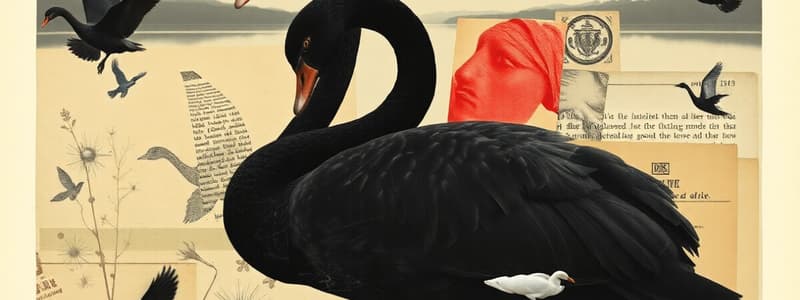Podcast
Questions and Answers
What does the author suggest about Platonic forms and their application?
What does the author suggest about Platonic forms and their application?
- They provide a perfect representation of reality.
- They inevitably lead to errors in all contexts.
- They are universally applicable without exception.
- They only function correctly in specific situations. (correct)
What was Luchino Visconti's approach to authenticity in filmmaking?
What was Luchino Visconti's approach to authenticity in filmmaking?
- Encouraging actors to improvise their lines.
- Creating environments that are purely fictional.
- Incorporating real elements, such as jewels in a closed box. (correct)
- Utilizing special effects to improve realism.
How does the author view essays in relation to other forms of writing?
How does the author view essays in relation to other forms of writing?
- As being less valuable than scientific reporting.
- As a way to recycle established ideas.
- As a personal and original form of meditation. (correct)
- As overly focused on avoiding controversial topics.
What is identified as a significant consequence of relying on models?
What is identified as a significant consequence of relying on models?
What might be a misconception held by philosophy students regarding the Black Swan theory?
What might be a misconception held by philosophy students regarding the Black Swan theory?
What does the author express about language problems in philosophy?
What does the author express about language problems in philosophy?
What does the mention of 'dullness' imply about the author's writing approach?
What does the mention of 'dullness' imply about the author's writing approach?
In what way does the author relate art and science in literature?
In what way does the author relate art and science in literature?
What literary approach does the author criticize for relying on anecdotal evidence?
What literary approach does the author criticize for relying on anecdotal evidence?
In what way does the author suggest the future is perceived by society?
In what way does the author suggest the future is perceived by society?
Which part of the book primarily focuses on our limitations in predicting the future?
Which part of the book primarily focuses on our limitations in predicting the future?
What concept does the author label as 'that great intellectual fraud'?
What concept does the author label as 'that great intellectual fraud'?
What does the author imply about the relationship between knowledge growth and predictability?
What does the author imply about the relationship between knowledge growth and predictability?
How does the author suggest we truly understand a friend's temperament?
How does the author suggest we truly understand a friend's temperament?
What is primarily ignored by the bell curve methods of inference according to the author?
What is primarily ignored by the bell curve methods of inference according to the author?
What was a significant point of contention during the Jewish revolt against the Romans?
What was a significant point of contention during the Jewish revolt against the Romans?
What does the author mean by 'Platonicity'?
What does the author mean by 'Platonicity'?
What type of knowledge does the author imply that terms like 'unknown' and 'uncertain' actually represent?
What type of knowledge does the author imply that terms like 'unknown' and 'uncertain' actually represent?
According to the author, what is often irrelevant in understanding social life?
According to the author, what is often irrelevant in understanding social life?
What does the author suggest about the understanding of health in relation to diseases?
What does the author suggest about the understanding of health in relation to diseases?
Which philosophical approach does the author critique in relation to knowledge?
Which philosophical approach does the author critique in relation to knowledge?
How does the author view the relationship between knowledge and 'Platonicity'?
How does the author view the relationship between knowledge and 'Platonicity'?
What aspect of social life does the author suggest is often overlooked?
What aspect of social life does the author suggest is often overlooked?
What does the author believe to be a limitation of modern philosophers?
What does the author believe to be a limitation of modern philosophers?
According to the author, what is the primary advantage of using stories over abstract ideas?
According to the author, what is the primary advantage of using stories over abstract ideas?
What metaphor does the author refer to that caused a contradiction as pointed out by Edna Ullmann-Margalit?
What metaphor does the author refer to that caused a contradiction as pointed out by Edna Ullmann-Margalit?
What does the author criticize about the concept of 'sterile skepticism'?
What does the author criticize about the concept of 'sterile skepticism'?
How does the author describe the current requirement for imagination in society?
How does the author describe the current requirement for imagination in society?
What does the author suggest is a consequence of focusing too much on what makes sense to us?
What does the author suggest is a consequence of focusing too much on what makes sense to us?
Which of the following does the author use as examples of 'practices of uncertainty'?
Which of the following does the author use as examples of 'practices of uncertainty'?
What does the author imply about the relationship between the general public and philosophical discourse?
What does the author imply about the relationship between the general public and philosophical discourse?
What does the author mean by the term 'narrative disciplines'?
What does the author mean by the term 'narrative disciplines'?
In the context of this content, what is the 'bottom line' referred to by the author?
In the context of this content, what is the 'bottom line' referred to by the author?
What was Yevgenia's perspective on the concept of a 'short story'?
What was Yevgenia's perspective on the concept of a 'short story'?
What was the response from the workshop instructor regarding Yevgenia's writing?
What was the response from the workshop instructor regarding Yevgenia's writing?
Why did Yevgenia decide to post her manuscript online?
Why did Yevgenia decide to post her manuscript online?
What factors contributed to the unconventional success of Yevgenia's book?
What factors contributed to the unconventional success of Yevgenia's book?
What societal trend do publishers believe about readers and writers?
What societal trend do publishers believe about readers and writers?
How did the publishing landscape change with Yevgenia's success?
How did the publishing landscape change with Yevgenia's success?
What does the term 'consilient prose' refer to?
What does the term 'consilient prose' refer to?
What change occurred in Yevgenia's personal life as she became successful?
What change occurred in Yevgenia's personal life as she became successful?
What significant realization did the literary scholars come to regarding writing genres?
What significant realization did the literary scholars come to regarding writing genres?
What does Yevgenia's evolution from 'egomaniac' to 'painstaking' illustrate about an author's journey?
What does Yevgenia's evolution from 'egomaniac' to 'painstaking' illustrate about an author's journey?
What was the significance of Yevgenia's manuscript being published unedited?
What was the significance of Yevgenia's manuscript being published unedited?
Flashcards are hidden until you start studying
Study Notes
The Black Swan
- The text refers to "The Black Swan" as a metaphor for the idea that rare, unpredictable events have significant impact
- Models and constructions, intellectual maps of reality, can be useful but can also be wrong, particularly when dealing with unpredictable events
- Models and constructions are like medicines, potentially helpful but with unpredictable and potentially severe side effects
- The "Platonic Fold" is the point where the gap between what we know and what we think we know becomes dangerous
The Importance of Stories
- The text argues that stories are more potent than ideas, easier to remember, and more fun to read
- The author uses a narrative approach to counter the narrative disciplines, which they believe are limiting and misleading
- Metaphors and stories are powerful tools for understanding and communicating ideas
- The use of narratives and stories can help to overcome our tendency to rely on overly simplistic models and narratives
The Dangers of the "Bell Curve"
- The text argues that the bell curve, the statistical method used to represent the distribution of data, is often misleading
- The bell curve ignores large deviations and extremes, making us overconfident in our ability to understand and predict events
- The "Great Intellectual Fraud" refers to the overreliance on the "bell curve" and other methods of statistical analysis, which can lead to inaccurate conclusions
The Importance of Uncertainty
- Uncertainty is not a category of knowledge, but rather the lack of knowledge
- The author argues against "sterile skepticism", which focuses on language problems without offering solutions
- The practice of uncertainty can be found in various fields, including piracy, professional gambling, and entrepreneurship
The Limits of Platonicity
- The author critiques "Platonicity", a tendency to mistake maps for territories and focus on well-defined forms instead of messy reality
- Platonic thinking leads to an overestimation of our understanding of the world
- People often privilege clear and simple models over more complex realities, a dangerous habit of thought
- The author advocates for embracing uncertainty and accepting the limitations of our knowledge
The Consequences of Naïve Empiricism
- Naïve empiricism refers to the practice of collecting selective data to fit a story and confirm pre-existing beliefs
- The author warns against this practice, arguing that it can lead to self-deception and ignorance of the truth
- The Black Swan theory is based on the concept of randomness and the unpredictable nature of reality
- We need to embrace the unpredictability of the world and focus on understanding the potential of extreme events
- The future is increasingly less predictable, and we should not be lulled into a false sense of security by conventional methods of understanding and prediction
- The author aims to move beyond the dominance of the known and the predictable, and instead focus on the unknown and the seemingly improbable
The Structure of The Book
- The book is divided into four parts, exploring different aspects of uncertainty and the importance of understanding unpredictable events
- Part One: "Umberto Eco's Antilibrary" - focuses on how we perceive and misinterpret historical and current events
- Part Two: "We Just Can't Predict" - examines our errors in dealing with the future and the limitations of some "sciences"
- Part Three: "Those Gray Swans of Extremistan" - delves into the topic of extreme events, explores the limitations of the bell curve, and examines the ideas of complexity in science
- Part Four: "The End" - provides concluding thoughts
Studying That Suits You
Use AI to generate personalized quizzes and flashcards to suit your learning preferences.



